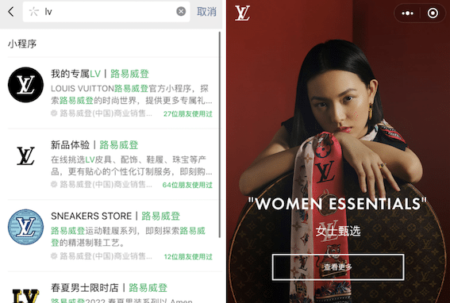Chinese New Year: Tips to boost luxury sales in China’s booming market
01/02/22
6'
Chinese consumers are the engine of worldwide growth in luxury spending, and the region is on track to become the biggest luxury market by 2025. Bain & Company reports double-digit luxury growth rates (36%) in 2021 in China, nearly doubling in overall size compared to 2019 despite increasing global social and economic challenges.
As Lengow welcomes the Chinese Lunar Year of the Tiger, we share the latest trends in China’s online luxury market, providing a reference for brands that are looking to tap into this opportunity by applying the right marketing strategy.
1/ Consumption influenced by younger consumer base and national identity
The main consumer of luxury goods is China’s Post-90s generation. This generation of consumers accounts for 50% of the total luxury consumer base and contributes 46% of spending, with half spending over RMB 50,000 ($7,860 USD) per year.
The new generation of consumers no longer blindly worship and follow luxury brands. They are increasingly interested in, service, experience and whether their self-image is compatible with the brand’s philosophy. They use multiple short video and social media platforms, such as Douyin, to get full access to product information and news and make purchase decisions after many cross-platform comparisons.
China’s younger generation–the mainstay of local social media–has a growing sense of self-awareness and national pride, and is resistant to being stereotyped. Brands that misrepresent the Chinese consumer should expect serious pushback–these netizens have little tolerance for tokenism and are notoriously unforgiving with advertising blunders. Brands must approach holidays such as the Lunar New Year with caution. These consumers and more concerned with how their diverse personalities, looks and interests are properly represented.
A best practice example: Prada is welcoming the Lunar New Year with its “Action in the Year of the Tiger” campaign, a charity project to protect tigers and raise awareness for the big cat species at the risk of extinction.
2/ One-to-One commerce via private traffic in the WeChat ecosystem
Private traffic refers to channels owned by a brand to communicate directly with its consumers, for example, a brand’s official account on WeChat or Weibo.
On WeChat, in-store sales representatives with access to branded accounts can chat directly with groups of online customers to advise about different products. This example of one-to-one commerce makes the online shopping experience more personal and brands have complete ownership of this data, giving them a better understanding of their customers’ journeys and mindsets.
WeChat is currently the most used social platform by Chinese consumers when discovering and researching luxury brands. Elsewhere on social media, there are many brands that leverage their local salespeople as Key Opinion Leaders (KOLs) and pull in consumers through live streamings. On the other hand, luxury brands use Weibo to highlight their products via brand ambassadors (normally celebrities).

3/ Research Online – Purchase Offline (ROPO)
According to a study by Tencent and BCG, China’s luxury consumers purchase from brands’ official websites, mini-programs, domestic and cross-border marketplaces, and physical boutiques. Around half of Chinese consumers are omnichannel and it is easy to see that online channels are becoming increasingly important in their journey; they browse multiple social platforms before making their final purchase decision. This means brands must be present on all channels, with detailed product descriptions, real customer reviews and attractive marketing points.
In the luxury market, the influential Post-90s segment prefers online research for offline purchases, researching particularly on the WeChat ecosystem.
Online Ads for Offline Sales white paper
Discover our new white paper about online & offline A guide to driving…
Learn more4/ De-branding of luxury–transformation into service brands
De-branding means that a brand no longer aims only to sell its products, but to offer service, interaction and experience as an added value to its customers, boosting stickiness.
The days of attracting consumers to luxury goods based on products alone are over; the more important aspect is “approach” and “communication”. For example, more and more luxury brands are launching mini-games, VR exhibitions, live fashion shows, Augmented Reality showrooms, branded gifs and more on WeChat to engage consumers. Chinese luxury consumers also value direct interaction with brand sales and customer service staff.
5/ NFTs and cross-border co-branding to deepen emotional connection with local consumers
Over the past two years, with the rapid rise of China’s local fashion industry, established luxury brands are increasingly co-branding with local Chinese brands.
Luxury fashion houses such as Burberry and Louis Vuitton are equally turning to non-fungible tokens (NFTs) and gaming to promote their brands, as interest in digital art takes off. The 2021 Metaverse Global Research Report states that over 80% of Chinese consumers have a positive attitude towards the metaverse.
Following the NFT trend is particularly timely given the growing consumer interest in the topic, accelerating consumer attention and increasing brand exposure. French luxury player Louis Vuitton’s experiment in mobile games and NFTs is paying off: Louis The Game has already been downloaded over 500,000 times. App Annie confirms that China is the biggest market to date driving downloads, indicating the popularity of the luxury brand paired in a mobile game format.
Luxury brands must carefully observe and research Chinese consumers to win their spend. Lengow has a dedicated Chinese team advising brands and retailers in the cross-border e-commerce industry. To find out more about e-commerce in China, get in touch with our team.
Image: freepik – junoteamllc
Your e-commerce library
E-commerce for Retailers
Learn moreE-commerce for Brands
Learn moreL'Oréal Luxe Success Story
Learn moreSign up for our newsletter
By submitting this form you authorize Lengow to process your data for the purpose of sending you Lengow newsletters . You have the right to access, rectify and delete this data, to oppose its processing, to limit its use, to render it portable and to define the guidelines relating to its fate in the event of death. You can exercise these rights at any time by writing to dpo@lengow.com

Trending Posts
Marketing channels
Where does Gen Z shop online?
Gen Z online shopping is transforming the digital marketplace, setting trends that redefine what it means to engage with brands…
16/04/24
9'
Marketplaces
The Top 10 Marketplaces in Europe
The e-commerce scene is a vibrant mix of marketplaces in Europe. These aren't just websites; they're bustling hubs where millions…
08/12/23
7'
Marketplaces
Lengow Now Fully Supports Zalando Logistics Solutions ZSS and ZRS
Zalando, one of Europe’s leading fashion marketplaces, continues to raise the bar with its advanced logistics and fulfillment programs. After…
12/12/24
4'
Marketplaces
How to win the Buy Box on Marketplaces (Amazon, Zalando, etc.)
What is the most important thing for marketplace sellers? Exactly, the Buy Box! If you don't have the Buy Box…
02/04/24
10'
Marketplaces
How to Sell on Temu? Best Tips
Emerging under the vast umbrella of PDD Holdings Inc., Temu has skyrocketed in popularity as a shopping sensation from China…
17/08/23
5'





